Posted by Elena del Valle on April 17, 2024
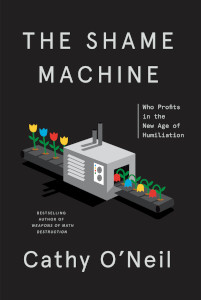
The Shame Machine
Photo: Penguin Random House
In The Shame Machine Who Profits in the New Age of Humiliation (Crown, $27), Cathy O’Neil, known for her previous book Weapons of Math Destruction, and Stephen Baker discuss their beliefs about shaming in society, especially via social media, and its effects on those targeted. The authors point to obesity, gender identity, possible body odor, addiction, poverty, political views, incels and hikikomori (a form of recluses in Japanese society) and age among the favorite subjects of those who shame people.
They say in that book that although shame may at times be used for social benefit, such as during the early years of covid to shame people into wearing masks and being vaccinated with an experimental vaccine, and to correct injustice; they believe it has increasingly become weaponized as a means to belittle the more vulnerable in society. They point to corporations, in particular Google and Facebook, and social media as the ultimate financial beneficiaries. In the case of hikikomori the financial motives may be less obvious although there are businesses dedicated to removing the recluses from the midst of their families, for a fee.
Most of us, the authors say in the chapter on humiliation and defiance, even if we are unaware, are likely to participate in shaming events. In the chapter on punching up they explain that punching up works when there is a choice and a voice. In that same chapter they explain that “shame is a toxin.”
They believe everyone should look at every aspect of life from the perspective of shame. They favor reparations for past wrongs. In lieu of shaming they propose an innovative approach to addiction: offering addicts a financial reward to visit methadone clinics; and giving money to the poor with no strings attached. A source of funding for these ideas was not evident.
The 255-page hardcover book published in 2022 is divided into 10 chapters in three main sections: Industrial Shame, Networked Shame and Healthy Shame. According the biography in the book O’Neil founded an algorithmic auditing company. In one case described in the book the work of her company (she was approached as an expert in “algorithms and crime risk scores) resulted in the release of a sexual predator convicted of raping an elderly woman. O’Neil wrote or co-wrote Doing Data Science and On Being a Data Skeptic.
Comments:
Filed Under: Books
Posted by Elena del Valle on April 1, 2024
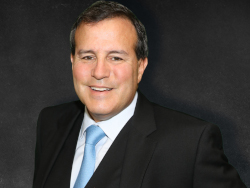
Howard Dvorkin, CPA, chairman, Debt.com
Photo: Debt.com
A podcast interview with Howard Dvorkin, C.P.A., chairman, Debt.com, is available in the Podcast Section of Hispanic Marketing and Public Relations, HispanicMPR.com. During the podcast, he discusses financial emergencies with Elena del Valle, host of the HispanicMPR.com podcast.
According to his bio Howard focuses his professional endeavors on consumer finance, technology, media, and real estate industries creating in addition to Debt.com, Consolidated Credit, PowerWallet, Start Fresh Today and Lifestyle Magazines; and is also the Chairman of the Board of FlexShopper, Inc.
According to his bio he has played an instrumental role in drafting state and federal legislation, was a consultant to the Board of Directors for the Association of Credit Counseling Professionals (ACCPros) and is the past president of the Association of Independent Consumer Credit Counseling Agencies (AICCCA).
To listen to the interview, scroll down and click on the play button below. It is also possible to listen by looking for “Podcast” then select “HMPR Howard Dvorkin, CPA” and download the MP3 file to your audio player. You can also find it on the RSS feed. To download it, click on the arrow of the recording you wish to copy and save it to disk. The podcast will remain listed in the April 2024 section of the podcast archive.
Posted by Elena del Valle on March 11, 2024
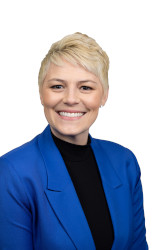
Brooke Goff, CEO, Goff Law Group
Photo: Goff Law Group
A podcast interview with Brooke Goff, chief executive officer, Goff Law Group, is available in the Podcast Section of Hispanic Marketing and Public Relations, HispanicMPR.com. During the podcast, she discusses smashing working mother stereotypes with Elena del Valle, host of the HispanicMPR.com podcast.
Brooke is also the founder of Goff Law Group, a woman-owned and operated personal injury law firm. According to her bio she is on “a mission to ensure that mothers in the workplace celebrate their life-changing milestones without having to sidetrack their careers;” and she seeks to be an inspiration for girls and a strong advocate for women.
According to her bio the 37-year old entrepreneur from Connecticut, made history by becoming the first female football player at her middle school, becoming the first openly-gay lawyer in her state and opening the first all woman law firm.
To listen to the interview click on the play button below. It is possible to listen by looking for “Podcast” then selecting “HMPR Brooke Goff” and downloading the MP3 file to your audio player. You can also find it on the RSS feed. To download it, click on the arrow of the recording you wish to copy and save it to disk. The podcast will remain listed in the March 2024 section of the podcast archive.
Posted by Elena del Valle on February 21, 2024
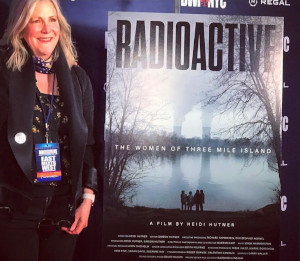
Radioactive poster and director
Photo: First Run Features
A new documentary, uplifting, inspiring and distressing, about the 1979 Three Mile Island, Pennsylvania nuclear power accident and the events that followed was released in theaters December 2023. It is due to become available on DVD and via Apple TV and Amazon streaming next month. Radioactive: The Women of Three Mile Island, from Three Mile Productions, shines a light on the “never-before-told” stories of four homemakers who take their community’s case against the plant operator to the Supreme Court as well as the story of a young woman journalist.
The 77-minute documentary consists of archival video and modern day interviews with some of the women who lived in the area at the time and others. The film features activist and actor Jane Fonda, whose film, The China Syndrome (a fictional account of a nuclear meltdown), opened 12 days before the real disaster in Pennsylvania. It also breaks the story of a “radical new health study” seeking to uncover the truth of the meltdown. According to promotional materials, for more than forty years, the nuclear industry “has done everything in their power to cover up their criminal actions” and insisted that “No one was harmed and nothing significant happened.”
According to the film in April 1979 a government commission studied the accident and concluded that although it was the fault of the nuclear operator no humans had been harmed. In the film Mary Olson, founder, Gender Radiation Impact Project, says “Radiation is ten times more harmful to young females than to Reference Man and 50 percent more harmful to comparable females.”
Heidi Hutner, the director, via a publicist, declined to be interviewed or to answer questions about the documentary. According to promotional materials for the documentary it won: Audience Award – Best Documentary at the Dances With Films Festival, New York City; Best Director and Best Documentary at the Full Frame International Film Festival, New York City; and Best lnvestigative Documentary at the Uranium International Film Festival, Rio de Janeiro.
Hutner is also the writer and producer of the film. According to promotional materials, she is professor of Environmental Humanities and Gender Studies at Stony Brook University, and a “scholar of nuclear and environmental history, literature, film, and ecofeminism;” and she is the winner of Sierra Club Long Island’s 2015 Environmentalist of the Year Award.
Posted by Elena del Valle on February 7, 2024

The Well-Lived Life
Photo: Simon and Schuster
India born Gladys McGarey, M.D., now 103, grew up to become a medical doctor in the United States. According to a recent article in The Wall Street Journal and her biography although she retired from her medical practice when she was 86 she continues to be a practicing doctor. Her biography indicates she lives in Arizona where she runs a life-coaching business. Last year she penned The Well-Lived Life A 102-year-old Doctor’s Six Secrets to Health and Happiness at Every Age (Atria, $27.99), a book about her life in which she shared some of the lessons she believes she has learned that may apply to readers.
According to the same Journal article she has been interviewed 200 times since May 2023. Someone managing her Instagram account appears to be active. A publicist, who responded via email, declined a podcast interview saying “her calendar is currently full for the time being” although no specific date was requested. The same publicist failed to respond to a recent request for the author to answer questions via email.
The 239-page hardcover book published last year is divided into six sections, one for each of the lessons. According to her book she believes readers should: have a purpose (she calls it juice) in life; keep moving through their lives; believe in the power of love; remember the importance of connectedness; learn from life experiences; and keep a positive attitude.
According to the website of The Foundation for Living Medicine (formerly, The Gladys Taylor McGarey Medical Foundation) the author sees patients one day per week and “She helps patients through difficult times with ‘life coaching,’ dream interpretation, and her own form of ‘Living Medicine.’”
Comments:
Filed Under: Books
Posted by Elena del Valle on January 10, 2024

Photo: Cassandraquave.com
In The Plant Hunter A Scientist’s Quest for Nature’s Next Medicines (Viking, $27) Cassandra Quave, Ph.D., associate professor of dermatology and human health, Emory University, shares her life’s journey in pursuit of plants and their curative properties. Quave describes her growing years in Florida, including a childhood peppered with surgeries, her pursuit of an education meant to lead her to medical school and her charge of heart following an internship in the Amazon.
The 371-page hardcover book published in 2021 is divided into three main parts: Nature, Infection and Medicine. In its pages the scientist describes her marriage to an Italian man and the birth of three children, alongside studying for a postgraduate degree, her search for a steady income stream that resulted in grants and took her to Emory University where she also became herbarium curator.
Two attempts to reach Quave by email via her website and the publisher over weeks failed. She responded initially to a more recent message and has yet to reply for an interview request.
According to her biography she leads anti-infective drug discovery research initiatives and teaches courses on medicinal plants, food, and health; is the co-founder of PhytoTek LLC, “a drug-discovery company dedicated to developing solutions from botanicals for the treatment of recalcitrant antibiotic-resistant infections.” Her website lists, among other current and past funding sources, the National Institute of Health, National Eczema Association, United States Agency for International Development and The Coca Cola Company.
Comments:
Filed Under: Books
Posted by Elena del Valle on December 18, 2023

Jennifer Chesak, author, The Psilocybin Handbook for Women
Photo: Jennifer Chesak
A podcast interview with Jennifer Chesak, author, The Psilocybin Handbook for Women, is available in the Podcast Section of Hispanic Marketing and Public Relations, HispanicMPR.com. During the podcast, she discusses her book and psilocybin mushrooms with Elena del Valle, host of the HispanicMPR.com podcast.
According to her bio Jennifer is an award-winning freelance science and medical journalist, editor, and fact-checker, and her work has appeared in several national publications, including The Washington Post. She earned her master of science in journalism from Northwestern University’s Medill, and she teaches in the journalism and publishing programs at Belmont University.
To listen to the interview, scroll down and click on the play button below. It is also possible to listen by looking for “Podcast” then select “HMPR Jennifer Chesak” and download the MP3 file to your audio player. You can also find it on the RSS feed. To download it, click on the arrow of the recording you wish to copy and save it to disk. The podcast will remain listed in the December 2023 section of the podcast archive.
Posted by Elena del Valle on December 4, 2023
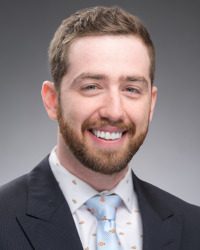
Fred Cohen, M.D., headache specialist, Mount Sinai Medical System
Photo: Fred Cohen
A podcast interview with Fred Cohen, M.D., headache specialist, Mount Sinai Medical System, New York City, is available in the Podcast Section of Hispanic Marketing and Public Relations, HispanicMPR.com. During the podcast, he discusses sleep and migraines with Elena del Valle, host of the HispanicMPR.com podcast.
An assistant professor of Medicine and Neurology at the Icahn School of Medicine at Mount Sinai, he is trained in Internal Medicine and Headache Medicine. A life-long headache sufferer, his research interests include treatments for chronic migraine and evaluating the epidemiology, burden, and impact of migraine. He is assistant editor of Headache: The Journal of Head and Face Pain and Current Pain and Headache Reports.
To listen to the interview, scroll down and click on the play button below. It is possible to listen by looking for “Podcast” then select “HMPR Fred Cohen, MD” and download the MP3 file to your audio player. You can also find it on the RSS feed. To download it, click on the arrow of the recording you wish to copy and save it to disk. The podcast will remain listed in the December 2023 section of the podcast archive.
Posted by Elena del Valle on November 13, 2023
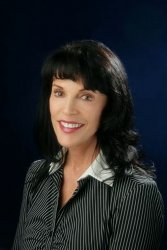
Lara Pizzorno, lead author, Healthy Bones Healthy You
Photo: Lara Pizzorno
A podcast interview with Lara Pizzorno, lead author, Healthy Bones Healthy You, is available in the Podcast Section of Hispanic Marketing and Public Relations, HispanicMPR.com. During the podcast, she discusses periodontal disease and osteoporosis with Elena del Valle, host of the HispanicMPR.com podcast.
Lara is also the lead author of a prior book on bone health, Your Bones; is the bone health expert on The AlgaeCal Community, a FaceBook group of 30,000 members, and is two thirds of the way through a Masters in Science in Clinical Nutrition at Maryland University of Integrative Health.
A member of the American Medical Writers Association for more than 25 years, Lara is senior medical editor for Salugenecists, Inc., and Integrative Medicine Advisors, LLC. She was editor of Longevity Medicine Review, which is no longer being published but remains available on line. A member of ResearchGate, she regularly writes review articles for physicians on issues related to healthy aging. Her latest papers are available on PubMed in Integrative Medicine: A Clinician’s Journal.
To listen to the interview, scroll down and click on the play button below. It is possible to listen by looking for “Podcast” selecting “HMPR Lara Pizzorno” and downloading the MP3 file to your audio player. You can also find it on the RSS feed. To download it, click on the arrow of the recording you wish to copy and save it to disk. The podcast will remain listed in the November 2023 section of the podcast archive.



















